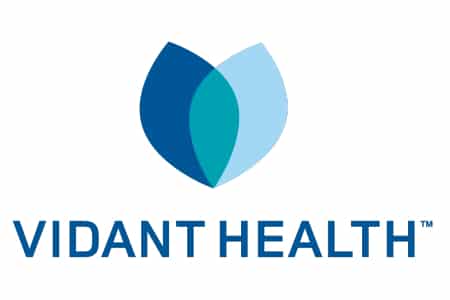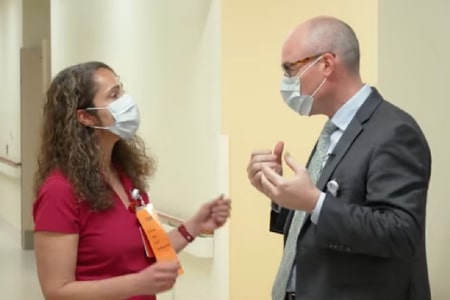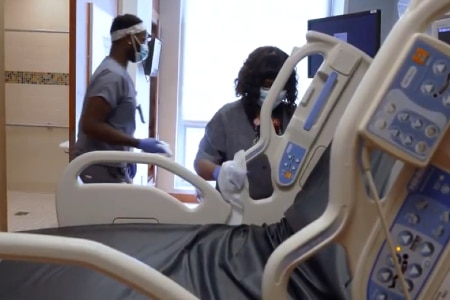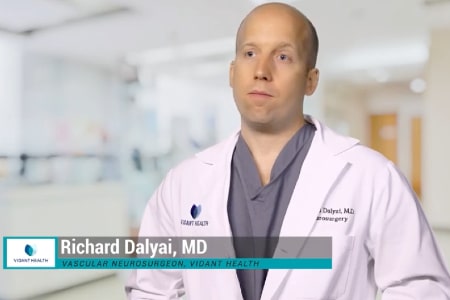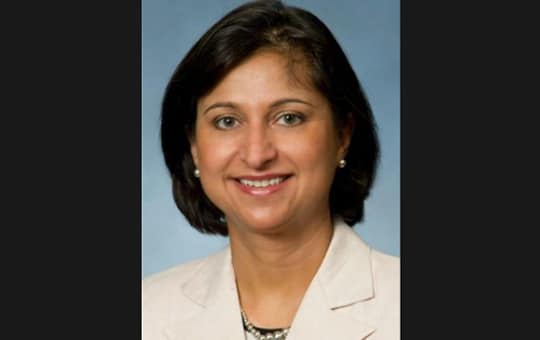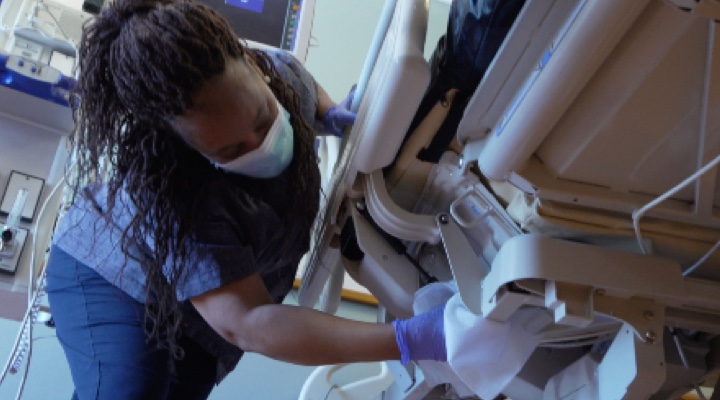Our capacity to test, not only for COVID, but other viruses such as the flu, is instrumental in keeping our communities safe, improving our economy and mitigating the risks we face as we plan for the future. Having the capacity to broadly and frequently test protects those we love.
To build a community response, we needed to know how prevalent the virus was in the region and to achieve this we had to increase testing capacities. We collaborated with East Carolina University, Thermo Fisher Scientific, GenMark Diagnostics, The Blood Connection, the Mayo Clinic and others to help build accurate, dependable testing tools needed to care for the 1.4 million people in our region.
Testing for COVID-19 comes in different shapes and sizes. A local company, Thermo Fisher was instrumental in helping us build the backbone of our large-scale testing capacity at nearly 5,000 tests a day. With their technology, we are able to test a large number of patients and get those that tested positive the care they needed. This ability is one reason Vidant was selected by the state of North Carolina to help with testing in historically underserved communities.
Chronic conditions did not disappear when COVID-19 arrived. Health events like strokes, heart attacks, diabetic episodes were still affecting those we love. GenMark Diagnostics, a company that develops state-of-the-art testing systems, helped us implement molecular testing capabilities for all Vidant hospitals. This helps quickly test those needing emergency care. In the fall, it will just as quickly help us identify patients that have potentially serious respiratory pathogens such as the flu, RSV, pneumonia, or COVID-19 with a single test.
COVID-19 serological antibody testing is a phrase we will all hear more about moving forward. This testing helps identify people who have had the virus in the past by looking for antibodies, which are left behind once a patient recovers. These antibodies are important in helping the health care community learn more about the virus and create vaccines and treatments, which will make a global difference.
Our partners at The Blood Connection, the primary supplier of blood products for Vidant, also offers serological testing and accepts blood donations to help gather these antibodies and provide them to our lab. At Vidant, we collaborated with ECU and The Mayo Clinic in Clinical Trials to analyze these antibodies and put this knowledge to use.
Testing is the foundation of our community response. Our ability to test is already helping us protect organizations and local businesses as they implement their strategies for safe openings. This in turn will help support our economy. The amazing collaboration between Vidant and all of our partners provides us with dependable testing we need to make a difference in the region we proudly serve.
Michael Waldrum, MD, is chief executive officer of Vidant Health.
Read more in The Daily Reflector
As COVID-19 cases continue to escalate across the country it has become painfully obvious that our loved ones with chronic conditions, especially in older populations, are particularly vulnerable to this virus. Cases continue to increase in the state, in our region and here in our local community. The risk is the highest it has ever been and the virus is spreading. As the COVID-19 pandemic evolves, we must continue to prioritize and protect the most vulnerable among us.
Wearing a mask in public is an important step in helping control the spread of COVID-19 and protecting our loved ones. We have all worked together in recent weeks to keep the curve flat by practicing social distancing, washing hands and avoiding large crowds. Now that our economy is reopening and we are seeing an increase in spread, we must continue to practice these safety measures and make them a priority. Masks are especially important when social distancing is not possible, when entering or exiting businesses and for employees who interact with customers. Masking allows us to open local businesses safely.
Masking and screening also has allowed Vidant to safely accommodate one healthy adult visitor in certain areas within hospitals and clinics for patients requiring support. Our expanded visitor restriction exceptions, which went into effect Friday at VMC and go into effet Tuesday at all other Vidant hospitals and clinics, are a result of our ability create a safe environment. We require masking for everyone in Vidant facilities and it has proven to be effective in preventing transmission.
Limiting visitation is one example of how this virus has upended our lives. It has been a very difficult and emotional concern and our ability to expand restrictions exceptions is directly linked to the ability to keep the spread from escalating.
These are unprecedented times and eastern North Carolina is resilient. Our success at keeping COVID-19 from spreading is dependent on our commitment to continue working together and taking simple steps to protect ourselves, our loved ones and the communities we care about.
Thank you for continuing to stand up for eastern North Carolina.
Brian Floyd, RN, MBA, is president of ECU Health Medical Center. Learn how to make a cloth mask, how to take care of if and wear it properly at vidanthealth.com/covidresources. For information on visitor restrictions, visit vidanthealth.com/alerts.
Susan Carson and the Environmental Services team she supports take pride in the important roles they play at ECU Health Medical Center
“We make sure that it’s safe and clean environment for our patients and our families to come and rest and get better,” said Carson, manager of Environmental Services at ECU Health Medical Center.
And never has what they do been more important.
“They are in the bottom of the trenches every day, having to come in here and do what it takes to keep this whole facility safe,” Carson said.
COVID-19 has required all hospitals and health systems to rethink just about everything – including how they keep facilities clean.
“It’s a hospital but it’s also a hospital that has never encountered this type of disease before,” Carson said. “Therefore, what we used to use yesterday is not effective in today. So we have to go and reach higher, do more, do it better.”
“That is their specialty, that’s what they do,” said Dr. Julie Kennedy Oehlert, Chief Experience Officer at Vidant Health, “And I also think their extra attention to high-touch surfaces, things you don’t think about that people touch, because remember the virus can live on surfaces like the elevator buttons, like door handles and all of that extra special attention is what keeps us all really safe.”
Vidant has taken a number of precautions to keep everyone who comes through their doors safe – this includes universal screening and masking, to protect against this airborne virus; visitor restrictions and keeping COVID-19 patients separate from everyone else; and investing in disposable cleaning tools and new technology.
“We did add Solaris machines, which are UV cleaning machines for our ORs and COVID rooms, after our COVID-positive patients leave and go home, because that’s what we want them to do,” Dr. Oehlert said.
And while these behind-the-scenes teams focus on keeping the environment safe – they never lose sight of the human side of health care.
“The biggest thing I’ve learned is, tomorrow is not promised,” Carson said. “Make the best of each day, and do what you can do to make someone’s day brighter.”
As COVID-19 spreads and creates uncertainty in all of our lives, mental health can easily deteriorate. People with pre-existing mental health or substance use struggles can experience more troubles than in the past and others who have no history with mental illness or substance use disorders may experience challenges for the first time.
Glenn Simpson, administrator for Behavioral Health at Vidant Health, said the most important thing people can do during this unprecedented time is reach out for help.
“People can have bad days and can feel down or become a little nervous, but we’re talking about actual diagnostic clinical depression and anxiety and when to seek help for that,” Simpson said. “It’s like anything, when they say if you’re feeling chest pains, what should you do? Call 9-1-1. It’s no different for behavioral health. You don’t have to wait until you know you are extremely depressed. It’s OK to ask as you’re experiencing changes.”
Simpson said substance use disorders are also likely to rise during this time of uncertainty.
While people are in quarantine and perhaps without work, it can create a situation in which people use drugs and alcohol more often.
“Usually when people use drugs, it’s to take away some level of pain, so you can think of it in a very real, physical sense,” Simpson said. “People reach out for drugs and alcohol to feel more comfortable. With people feeling less comfortable with COVID, we’re certainly anticipating that more people will either be misusing drugs or misusing more if they already have been misusing. We anticipate that there will be more folks suffering with substance use disorders.”
North Carolina Gov. Roy Cooper made a proclamation earlier this month to recognize May as Mental Health Awareness Month. In the proclamation, Cooper highlighted that while mental illness can be successfully treated, 60 percent of adults nationwide do not receive the treatment needed.
Simpson said with the technology available and awareness around the toll a pandemic can take on mental health, there are many options for those seeking treatment.
Some of those options include:
- Hope4NC Helpline: 1-855-587-3463
- National Suicide Prevention Hotline: 1-800-273-8255
- Integrated Family Services Mobile Crisis Team: 1-866-437-1821 (available in select NC counties)
- The National Disaster Distress Helpline: 1-800-985-5990 or text TalkWithUs to 66746
- Mental Health America: Text MHA to 741741
- National Alliance on Mental Illness
Simpson said he believes, much like the wave we are experiencing with COVID-19, there will be a wave of patients seeking help for mental illnesses and substance use disorders. He compared it to the aftermath of a hurricane, and said when people are dealing with a damaged home, they will focus on their primary need for housing before seeking care for their mental health well-being.
His hope is that people will seek help before a situation gets too dire for an individual.
“It’s OK to reach out for substance use help and mental health help, just like we do for our physical health,” Simpson said. “We do know that for the most part, a lot of interventions for behavioral health can be done through technology. The technology is there and folks are ready and willing to help – you just have to reach out, and don’t wait too long.”
“We’ve seen patients delay care because they want to see if things will potentially get better on their own, or they don’t want to interact with the hospital or they are concerned about getting COVID-19,” said Dr. Richard Dalyai, a vascular neurosurgeon with Vidant Health.
While Dr. Richard Dalyai understands those concerns, he’s also worried about what it may mean for the stroke patients he serves.
“Patients in eastern North Carolina are about four times more likely to die of a stroke than North Carolina itself,” said Dr. Dalyai. “We know that the treatments that we do are highly effective, but they are most effective within a four, six or eight-hour window.”
Time is of the essence for many of the conditions Vidant treats.
“Eastern North Carolina has a population with a lot of comorbid conditions and chronic conditions, like heart disease and cancer, diabetes, strokes,” said Brian Floyd, chief operating officer for Vidant Health. “We’ve built a health system here to manage that and help people deal with those chronic conditions.”
Vidant is ready and safe.
“Vidant has been working very hard for months now to make sure this is a safe place,” said Floyd.
“Our standards remain the same, of excellent care,” Dr. Dalyai said. “During the pandemic, for patients with COVID-19, as well as for patients without COVID-19.”
Those standards apply to providing sound medical advice as well.
“It’s a confusing time, sorting through medical information that’s available on social media and through the internet,” said Dr. Dalyai. “To get the proper and best information is going to be from your health care provider.”
Vidant has a Community Resource Line available 12 hours a day. That number is 252-847-8000 and answered from 8 a.m. to 8 p.m. seven days a week.
We learned that decisive action by state and local government and a community effort to stay home was the best way to protect those we love.
Now that the curve continues to flatten, Vidant is phasing in the essential care and services, defined as any surgery or procedure that, if not done within four weeks, would potentially harm the patient. This includes select general and orthopedic surgeries, cardiac, vascular and gastroenterology procedures.
Dr. Michael Waldrum, CEO of Vidant, said eastern North Carolina has higher rates of chronic conditions and diseases meaning these essential care and services play a large role in caring for the region. He said it will be important to take a phased approach over time to ensure safety of patients and team members. He said Vidant is using well-established protocols that reflect guidelines and best practices outlined by the Centers for Medicare and Medicaid Services, the U.S. Surgeon General and the Centers for Disease Control and Prevention.
